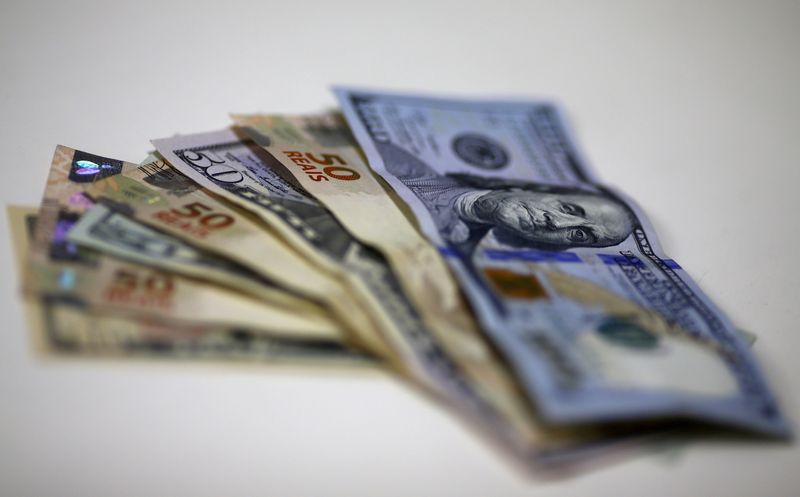By Gabriel Burin and Tushar Goenka
BUENOS AIRES/BENGALURU (Reuters) - Brazil's real will continue to get some aid this year from solid trade surpluses and further interest rate hikes that should help avoid bigger losses for the currency as domestic tensions intensify, a Reuters poll showed.
The real has been rangebound, trading 4.90-5.40 against the U.S. dollar for roughly three months, while Brazil benefits from an export boom fueled by China's recovering demand and a weak exchange rate after the coronavirus-related hit of 2020.
A strong current account result has become the economy's brightest spot, driving hard currency into Brazil at a time when some investors who are too worried about local politics keep selling the real, pushing it downwards.
In the short term, it is likely to settle near the mid-point of its recent interval, close to 5.15, not far off where it is trading now, according to median estimates of 22 strategists in a poll taken Aug. 31-Sept. 2.
"The trade balance, commodity prices, terms of trade, interest differentials, and a reduction in global risk aversion, in general are associated with a stronger BRL," said Ramon Wiest, executive manager at Caixa Economica Federal.
Brazil posted a $7.7 billion trade surplus in August, keeping a stellar performance of record monthly levels due to a steady flow of high-volume sales of key commodities like soybeans and iron ore.
Also favoring the local currency, the central bank is expected to hike its rate further to 7.0% by the end of 2021, according to a separate Reuters poll, closing the year with a staggering increase of 500 basis points, cumulatively.
Still, the real was projected to depreciate 4.0%, from Thursday's levels of 5.18, to change hands at 5.40 against the greenback in 12 months, when Brazil will be going through the final leg of the campaign for next year's presidential vote.
Reuters poll graphic on the outlook for USD/BRL and USD/MXN: https://tmsnrt.rs/3kQKV3a
That softer outlook reflects the country's bitter political climate. Cranking up the rhetoric, President Jair Bolsonaro said last week he saw three alternatives for his future: winning the 2022 elections, death or prison.
He has previously questioned Brazil's electronic voting system and threatened to not accept October's vote results. Bolsonaro trails former leftist President Luiz Inacio Lula da Silva in most opinion polls.
In Mexico, the peso will follow a softer trend into next year after months of unremarkable trading performance. It is expected to trade at 20.45 per U.S. dollar in 12 months, shedding around 2.3% from this week's trading levels.

The main concern is how stimulus tapering will pan out in the United States. "The peso will tend to weaken as expectations of a more restrictive stance by the U.S. Federal Reserve increase," said Ricardo Aguilar, chief economist at Invex.
(For other stories from the September Reuters foreign exchange poll:)
(Reporting and polling by Gabriel Burin in Buenos Aires; Additional polling by Mumal Rathore, Susobhan Sarkar and Devayani Sathyan in BENGALURU; Editing by Ross Finley and Jonathan Oatis)